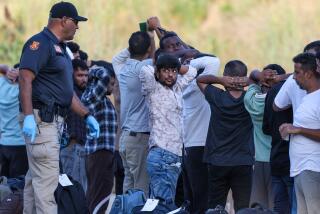Muslim ‘radicalization’ hearing a success, say Rep. Peter King, Republicans
- Share via
WASHINGTON -- Rep. Peter King and his fellow Republicans in the House declared their much-criticized hearing into Muslim “radicalization” in America a success, even as detractors slammed it as an “outrage” and “reality TV.”
“Our hearings today were informative and educational and hopefully will have consequences in the Muslim American community,” King, chairman of the Homeland Security Committee, told reporters after the more than four-hour hearing on Capitol Hill on Thursday.
“The hysteria and madness leading up to this did nobody much good,” he said.
“The purpose of today’s hearing was to inform, not to inflame,” added Rep. Dan Lungren of California.
King, a New York congressman, spent much of the day offering a strident defense of the hearing, which examined the risk of “homegrown” Islamic terrorism, while Democrats and civil-rights groups decried it as a divisive spectacle that they argued would sow mistrust in Muslim American communities nationwide.
“To back down would be a craven surrender to political correctness and an abdication of what I believe to be the main responsibility of this committee -- to protect America from a terrorist attack,” King said in his opening remarks.
At the close of the hearing, King pledged more inquiries would soon follow, including one that would focus on radical Islam in America’s prisons.
The committee heard testimony from several members of Congress, including Rep. Keith Ellison (D-Minn.), a Muslim who perhaps provided the day’s most memorable moment when he broke down and tearfully described the actions of a Muslim paramedic from New York who died while responding to the 9/11 attacks.
“Mohammad Salman Hamdani was a fellow American, who gave his life for other Americans,” Ellison said. “He should not be identified as just another member of an ethnic group or just another religion, but as an American who gave everything to his fellow Americans.”
Democrats made clear they disapproved of the proceedings.
Ellison charged that King was “stereotyping and scapegoating” Muslims. Rep. Sheila Jackson-Lee of Texas, shouting over King’s pounding gavel, labeled the proceedings “an outrage.” Rep. Yvette Clarke, a New York Democrat, dismissed the hearings as “great congressional theater” and “the equivalent of reality TV.”
Rep. Laura Richardson of California compared King to the notorious Sen. Joseph McCarthy of Wisconsin, who led the anti-Communist witch hunts of the 1950s.
But Republicans maintained that they were not demonizing Islam. “The focus of this hearing is not the Islamic religion. It’s Islamists. It’s Jihadists,” said Rep. Paul Broun of Georgia.
Los Angeles County Sheriff Lee Baca took a central role in the testimony. The only law enforcement officer to appear (he was invited by Democrats), he repeatedly stressed the need for building trust between the police and Muslim Americans and other communities in regions such as Southern California.
Baca warned against a “a false assumption that any particular region or group are more prone to radicalization than others,” noting a high number of terror-related plots that did not involve Muslims. He also noted that Muslim Americans had helped foil “seven of the last 10” plots launched by Al Qaeda in the United States.
Republicans on the panel singled out the Council on American-Islamic Relations, a Washington advocacy group, as contributing to a culture in America in which imams and mosques are encouraged to be uncooperative with law enforcement.
“I have said that there are too many mosques that do not cooperate with law enforcement, and I think the testimony today has backed that up,” King said.
But Baca said he knew of no allegations in Los Angeles that CAIR encouraged Muslims to not cooperate with his deputies.
“I have not experienced anything that suggests that CAIR supports terrorism in Southern California,” he said.
Baca got into a low-key but tense exchange with Rep. Chip Cravaack of Minnesota, who essentially accused Baca of “dealing with a terrorist organization.”
Baca said the Cravaack’s question sounded more like an accusation. “If the FBI has something to charge CAIR with and deal with it in that way,” Baca said. “If CAIR is a criminal organization, prosecute them.”
Baca told that panel that because of his department’s outreach efforts to the Muslim American community, “we can go into mosques in Los Angeles, and we do that frequently.”
“Muslims are just as independent, just as feisty, just as concerned about their safety,” he added. “They certainly don’t want their homes or mosques blown up.”
Baca testified alongside Melvin Bledsoe and Abdirizak Bihi, both of whom had family members they said were converted to violent and radical Islam. Beldsoe’s son, Carlos, now known as Abdulhakim Mujahid Muhammad, is accused of killing one Army private and wounding another in an attack on a military recruiting center in Little Rock, Ark., in 2009.
Bledsoe said Americans are “in denial” about the threat of homegrown Islamic terrorism.
“Americans are sitting around doing nothing about radical extremists,” Bledsoe said. “This is a big elephant in the room. Our society continues not to see it.”
james.oliphant@latimes.com
More to Read
Sign up for Essential California
The most important California stories and recommendations in your inbox every morning.
You may occasionally receive promotional content from the Los Angeles Times.










